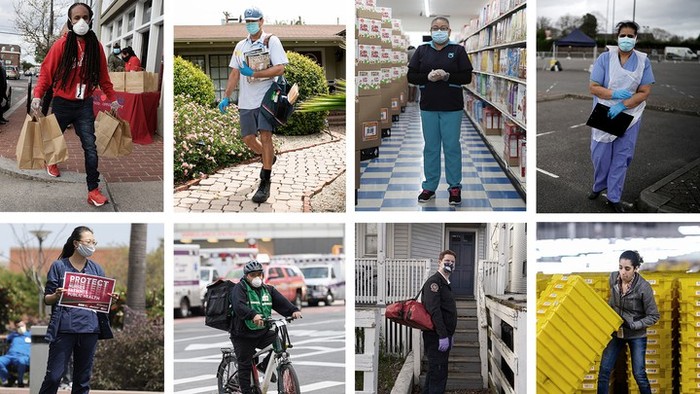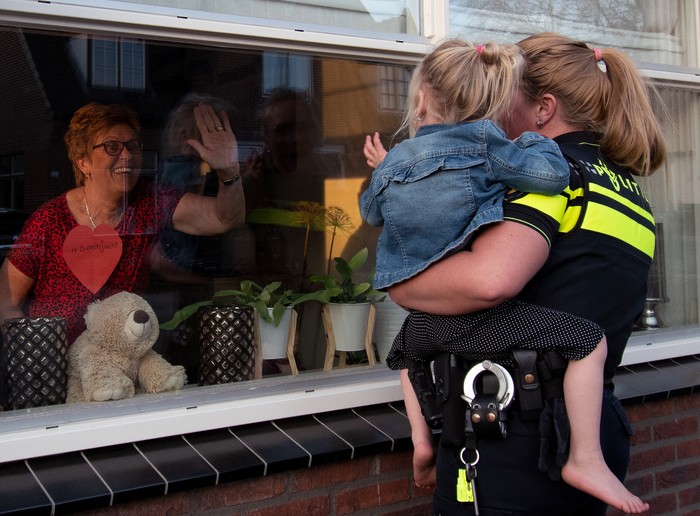|
|
|
America’s newfound appreciation for essential work could change the future of the working class. Then, we send you into the evening with a beautifully written non-newsy yarn that has nothing to do with the coronavirus.
|
The COVID-19 Outbreak
This outbreak tends to sow more uncertainty than certainty, but it’s made one thing very clear: what constitutes essential work. As my colleague Olga Khazan frankly put it: “It’s not the people who get paid to write tweets all day, but the people who keep the tweeters in chickpeas and Halo Top.”
Those kinds of workers tend to earn less. By and large, Americans seem grateful to them for putting their lives at risk. But could this pandemic reshape the country’s working class?
For starters, why do so many essential workers earn so little? Annie Lowrey posed this question to economists and labor experts and found the answer discomfiting. “They’ve been systematically devalued for years,” she writes. “But they don’t have to be.”
In the past, pandemics have triggered positive changes for workers. One study examined 15 major outbreaks, finding that they increased wages for three decades afterwards, my colleague Olga Khazan reported in her sweeping piece on how the coronavirus could trigger a populist movement (either liberal or conservative).
There are some early signs of political movement. “Though it’s garnered little notice, Congress has laid the groundwork for this potential new economic floor in its recent emergency legislation,” our staff writer Ronald Brownstein points out. “While these measures are all temporary, they represent the first openings in the previous resistance from congressional Republicans and the business community to such ideas.”
Further reading: Darcy Courteau, a writer, photographer, and meal-delivery courier, describes what it’s like to be classified as “essential” in this personal essay.
|
One question, answered: In states that have reopened, can grandparents see their grandchildren?
Joe Pinsker, a staff writer for our Family section, asked a few experts. Here’s what they had to say:
The idea of children being physically close to an older person they don’t live with made the three experts uneasy. “I know grandparents and grandchildren want to cuddle,” [Linsey Marr, a civil- and environmental-engineering professor at Virginia Tech,] said, but “I know I would feel horrible if we visited with grandparents and it turns out my kids ended up getting them sick, and then they died.”
So the answers are “Maybe” and “Only really carefully.” It’d be prudent for grandparents to stay at least six feet away from grandkids, and for visits to take place outdoors. Making exceptions to those guidelines is riskier when older adults are involved than it is with people who aren’t especially vulnerable to COVID-19.
What to read if … you just want practical advice:
Tonight’s Atlantic-approved quarantine activity:
Emma Donoghue, the novelist best known for her 2010 book Room, returns with a new piece of fiction, available to read on our site. “The Blood Tax” is taken from her forthcoming novel, The Pull of the Stars, which is set during the 1918 flu pandemic. “Yes, it’s been rather eerie to reread the text,” she told Thomas Gebremedhin, a senior editor for our magazine, over email. Read their full conversation about her writing process.
What to read if … you’d like to read about something—anything—other than the coronavirus:
Get lost in this thrilling long read about one scholar’s stunning discovery of a piece of papyrus from the century in which Jesus is said to have lived, and the allegations of theft, cover-up, and fraud that followed.
View all of our stories related to the coronavirus outbreak here. If you’ve been able to exercise during the pandemic, how have your habits changed? Do you plan to go back to your gym (or other athletic facility) when it reopens? Tell us.
|
The Atlantic Crossword9-Across, three letters: 1951 Baseball Hall of Fame inductee Mel
Try your hand at our daily mini crossword (available on our site here), which gets more challenging through the week.
|
About Us
This email was written by Caroline Mimbs Nyce and edited by Shan Wang. Questions, suggestions, typos? Reply directly to this newsletter or write to caroline@theatlantic.com anytime.
Did someone forward you this newsletter? Sign yourself up for The Daily here.
|
Most Popular on The Atlantic |
|






Comments